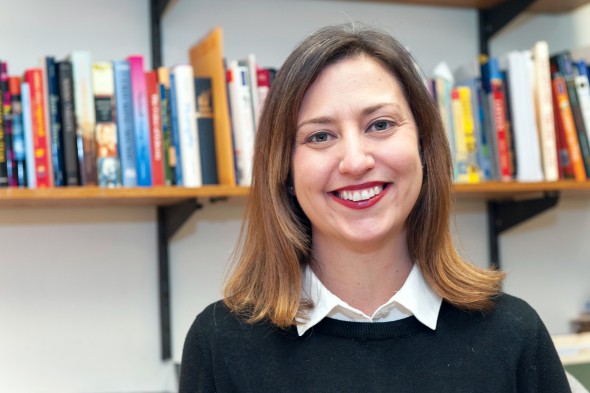Music, anthropology and French tourists

“I’m an ethnomusicologist,” says Ruth Rosenberg. “I take an anthropological approach to music. I’m interested in social and cultural anthropological depth as it relates to broader phenomena.”
Music, tourism and fin-de-siècle France come together in Ruth Rosenberg’s new book.
Rosenberg, assistant professor of music in the School of Theatre and Music, is the author of Music, Travel and Imperial Encounter in Nineteenth-Century France: Musical Apprehensions.
“I’m an ethnomusicologist,” she explained. “I take an anthropological approach to music. I’m interested in social and cultural anthropological depth as it relates to broader phenomena.”
Her field is relatively new, having coalesced in the ’60s. “It started because music historians generally studied the heroes of Western music — Bach, Mozart, Beethoven,” she said. “Today ethnomusicologists study non-Western, folk and ethnic music.
“It’s saying, ‘Hey, there’s this other stuff going on in the world, not just what’s in the opera houses, but what is meaningful in everyday life around the world, and not just in a European context.”
Instead of focusing on classical composers, her book is about French travelers’ and folklorists’ encounters with non-Western and foreign music in and out of France. “My interest was particularly in travel writing and how people write about music as a way to understand different people and places,” Rosenberg said.
The book’s first chapter is about Napoleon’s invasion of Egypt. “He had a dream of opening up what now is the Suez Canal, in a race against the British,” she said.
The French occupied Egypt for three years. Although the campaign ended in defeat, a team of 150 scholars and scientists recruited by Napoleon had, in the meantime, undertaken significant work in archeology, engineering, botany and medicine. Among them was the musicologist Guillaume André Villoteau, who published three voluminous chapters when he returned to Paris on what he heard.
“I became fascinated by this person, an opera singer who did research about Egyptian music,” Rosenberg said. “I call him a proto-ethnomusicologist.
“French people knew very little about music outside of Europe in 1798, when Villoteau was in Egypt. Arabic music follows a different musical system and has features that were shocking and even repulsive to his ear. He tried to discover first-hand how Egyptian musicians tuned their instruments and what scales they were using.”
Rosenberg also writes about French Romantic writers who traveled in North America.
“The French has been kicked out by the British, and they thought of Native Americans as lost subjects of the French Empire,” she said. “They encountered remnants of music, some of it French and some indigenous.”
In another chapter, Rosenberg looks at intellectual collectors of French folk music little known in Paris. “They were building a monument to song, saying ‘Here are all the songs of France in the Second Empire,’” she said.
Rosenberg also turns to the music of Corsica, an island in the Mediterranean where Napoleon was born. “When visitors started arriving to explore the island, Corsica was considered a backwater, not really part of France,” she said.
Tourists wrote about the music improvised at funerals by women about the deceased. “This practice of lamentation was viewed as a very ancient, primitive tradition that played into stereotypes about Corsica,” Rosenberg said. “It was called the land of the vendetta, blood feuding between families. There were folk ballads about people who’d been murdered.”
French listeners were frightened by the moving, expressive laments that women sang, she said. “In contrast to the way in which male eloquence was viewed during Enlightenment, I argue that Corsican female lament was represented as an undisciplined and possibly immoral force.”
Rosenberg is from St. Paul, Minnesota. She joined UIC in 2008 and lives in Logan Square. She earned her bachelor’s degree at the University of Wisconsin-Madison and Ph.D. at the University of Pennsylvania. During her postdoctoral studies at Columbia University, she joined a gagaku ensemble, performing classical Japanese music. She plays the ryuteki, a bamboo flute, and returns occasionally for performances.
Rosenberg teaches a variety of classes about classical, world and popular music, including a new course on gender and sexuality in music. She recently received a Teaching Recognition Program Award.
“I’m very proud of it,” she said. “Teaching is something I love.
“So many of my students enroll in music classes because they love music and want to know more. It’s gratifying to build upon their enthusiasm and talent as performers and listeners and to direct this into a more focused, intellectual endeavor. They become discerning and more adventurous listeners.
“The student body of UIC is so diverse and, although it sounds cliché, I learn something new and exciting nearly every day from my students.”
